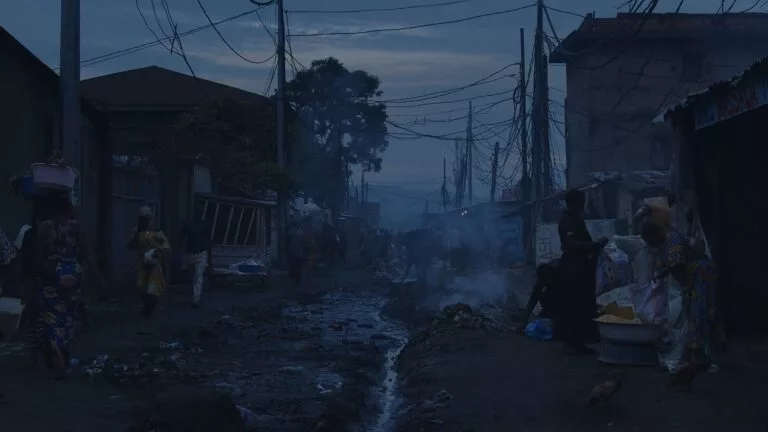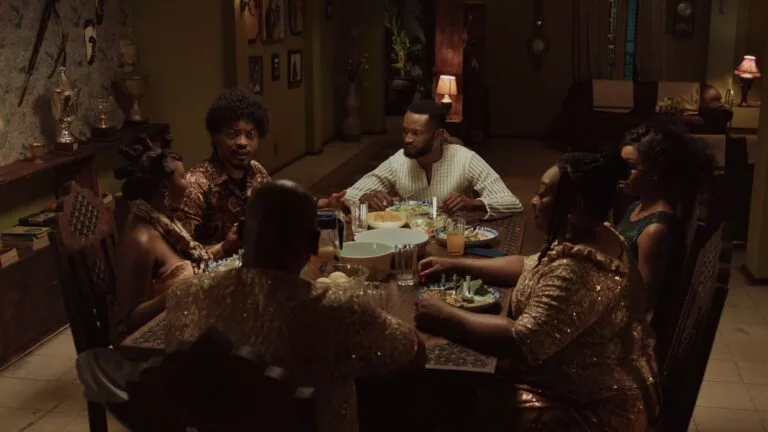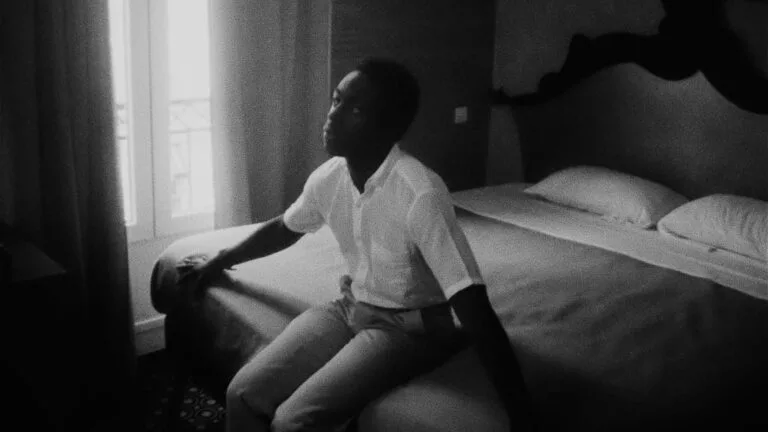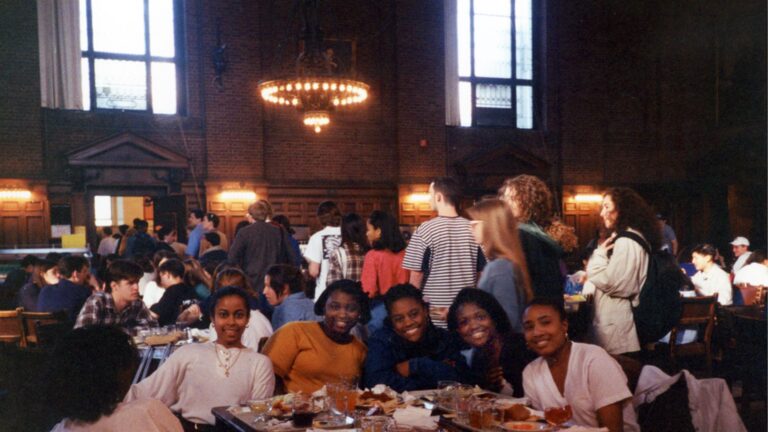Attending the Black Harvest Film Festival feels like a rite of passage—a celebration of Black storytelling that captures the spirit and resilience of our community. But as a Black man, it offers something even more profound: an opportunity to escape, reflect, and find solace in shared experiences. This year’s lineup was no exception, showcasing a powerful range of films that explore identity, resilience, and joy in the face of adversity. Among them, “Black Table” stood out as a transformative viewing experience that I won’t soon forget.
In the wake of political unrest and a sense of hopelessness in the United States, John Antonio James and Bill Mack’s documentary “Black Table” is exactly the film I needed. It chronicles the journey of several Black Yale alumni as they reunite for their 25th college reunion, reflecting on their time at the prestigious university and finding solace in one another, one meal at a time, around a shared dining table.
“Black Table” is more than a snapshot of these students’ experiences—it resonates as a universal narrative for Black people across the diaspora. It captures the shared struggle of existing in predominantly white spaces, where being “othered” and excluded for how you look is a deeply painful and isolating reality. Yet, the documentary also illustrates that community is the key to resilience. Through solidarity, Black people not only survive but thrive in environments that often seem inhospitable.
Unfortunately, the challenges faced by Black communities remain consistent across generations. Yet, this is also a profoundly hopeful story. Despite the hardships these alumni encountered on campus, they created joy and kinship among themselves, symbolized by their chosen table in the dining hall. Their laughter and camaraderie were acts of quiet rebellion, and this film is a testament to the power of that resistance.
In a time when affirmative action was abolished in 2023 and DEI (Diversity, Equity, and Inclusion) initiatives are being rolled back, “Black Table” feels especially evocative. It reminds us, as Kendrick Lamar aptly put it, that “we gon’ be alright.”

“Rising Up At Night,” Nelson Makengo’s debut feature documentary, is a mesmerizing experience. The film explores the aftermath of a turbulent election and the proposed construction of Africa’s largest power plant in the Congo, a project that has plunged 17 million people into darkness. From the very first frame, the audience is enveloped in shadow—not a blank, empty void, but an all-encompassing darkness filled with texture. It’s the kind of darkness you sense when you close your eyes, with indiscernible grain flickering like an underexposed camera capturing hidden realities.
Makengo masterfully finds beauty in the obscurity, using minimal light sources—a phone, a flashlight, a headlamp—to illuminate his subjects. Yet the true radiance of “Rising Up At Night” lies in its portrayal of the people of Kinshasa, the capital of the Democratic Republic of the Congo. Makengo invites viewers into the community, offering an intimate, quiet observational perspective that feels like being a fly on the wall. The warmth and resilience of Kinshasa’s people shine through, with their smiles and profound connections to one another striking an emotional chord. Their unyielding faith and perseverance against insurmountable odds inspire both admiration and a longing for transformative change on their behalf.
The film is a well-rounded narrative, blending the perspectives of everyday citizens, like Davido, who searches for shelter after his home is flooded, with those of pivotal community leaders like Pastor Gédéon and Kudi. These two men anchor the story, exuding strength and charisma that captivate the audience and elevate every scene they inhabit.
Makengo’s storytelling is a revelation, proving that cinema can be a powerful medium for raising voices. With “Rising Up At Night,” Makengo delivers a resounding cry for justice and humanity, leaving no doubt that his creative journey is destined for greatness.

Nigerian filmmaker Daniel Oriahi’s “The Weekend” is a thrill ride from start to finish. The story centers on Nikiya (Uzoamaka Aniunoh), an orphaned woman spending the weekend with her fiancé’s estranged parents for their wedding anniversary. However, this seemingly joyful occasion is shrouded by a dark family tradition that turns the film to horror. Oriahi masterfully builds tension in the opening moments, creating a palpable unease that persists until the first kill. He keeps viewers on the edge of their seats, with each twist heightening the suspense.
Bucci Franklin, as Luc, is a standout, bringing a desperation to the character that intensifies with each scene, making the audience question what “doing the right thing” might look like in such a family. Aniunoh’s portrayal of Nikiya is also remarkable; she serves as the audience’s eyes and ears, uncovering the unsettling secrets of Luc’s family. Like Nikiya, we remain unaware of the family’s hidden truth until it gradually—and terrifyingly—reveals itself.
While “The Weekend” is rooted in horror, it’s also a tragic love story. Luc and Nikiya seem worlds apart, with Nikiya yearning for family connections while Luc desperately seeks to escape his. Tragedy and trauma converge in an unexpected ending, underscoring that love sometimes falls short. If Hollywood isn’t yet calling for Oriahi, it should be.

Director Yashaddai Owens’ “Jimmy” is, on paper, a reimagining of the early years of writer and civil rights activist James Baldwin in Paris after his departure from New York. In reality, however, it is a film that abandons traditional plot in favor of energy and mood. “Jimmy” is a “slice of life” narrative that celebrates Black Boy Joy through everyday moments. Shot on 16mm film, Owens transports viewers into Baldwin’s world, giving us sights and sounds the writer may have experienced. Through set design, costumes, and the casting of Benny O. Arthur—whose resemblance to Baldwin is striking—Owens creates a compelling fantasy. Arthur’s portrayal of Baldwin is remarkably lifelike, as if Baldwin himself had leapt from his own pages. He moves across the screen with an effortless freedom, reflecting the sense of liberation Baldwin likely felt as an expatriate disillusioned with American racism. We witness Jimmy’s inner peace as this new world opens to him.
Owens, serving as both director and cinematographer, adopts a French New Wave style, relying exclusively on natural light and shooting on location to immerse the audience. He frequently abandons script-driven storytelling in favor of spontaneity, with his lens capturing raw, unfiltered moments—exposure be damned. Many shots fall into shadow, with indistinct silhouettes and persistent grain, contributing to an evocative atmosphere.
His artistic choices may not resonate with mainstream audiences. As Alfred Hitchcock famously said, “Drama is life with the dull bits cut out,” and unfortunately, this film feels like mostly the “dull bits.” The visual charm of mid-century Paris fades as modern technology—cell phones, cars—emerges on screen, grounding the setting more in the present than in Baldwin’s era.
While Owens’ cinematography occasionally produces stunning results, his reliance on improvisation results in inconsistencies, leaving the final product struggling to fill its runtime with only a handful of cohesive shots. Although “Jimmy” offers a rare and joyful portrayal of Baldwin beyond America’s racism, it’s ultimately not a film I’d revisit.

